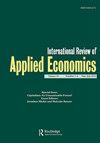新冠肺炎疫情对经济的影响和政府对福利制度的反应
IF 1.4
Q3 ECONOMICS
引用次数: 2
摘要
摘要新冠肺炎疫情扰乱了各国的生活,对全球经济产生了严重的负面影响,造成了大量生产和就业损失,并增加了国家债务。鉴于经济影响和政府应对措施在结构上植根于一个国家的福利制度类型,本研究使用描述性和统计方法,考察了选定经合组织国家的经济影响和经济应对措施,这些国家的福利机制不同。我们的描述性研究结果表明,在社会民主国家,GDP下降和失业率上升的情况没有那么严重,而在自由国家,政府债务的上升更为剧烈。我们还发现,至少在疫情持续期间,各个福利制度的社会支出都有一定程度的趋同。使用面板回归分析,我们发现更多的检测和更高的疫苗接种与GDP增长呈正相关。另一方面,遏制措施和紧急经济支持与GDP增长呈负相关。此外,我们的统计分析证实了这一描述性发现,即与社会民主国家相比,自由和保守国家的疫情对GDP的不利影响更为明显。本文章由计算机程序翻译,如有差异,请以英文原文为准。
The Covid-19 pandemic economic impacts and government responses across welfare regimes
ABSTRACT The Covid-19 pandemic disrupted lives across all countries, and had severe negative impacts on the global economy, with a massive loss of production and employment, and an increase in national debts. Given that the economic impacts and government responses are structurally rooted in a country’s type of welfare regime, this study examines the economic impacts and government responses in selected OECD countries as differentiated by their welfare regimes using both descriptive and statistical methods. Our descriptive findings indicate that GDP drop and higher unemployment have been less severe in the social democratic countries, and the rise in government debt has been more dramatic in the liberal countries. We also find some degree of convergence in social spending across the welfare regimes at least as long as the pandemic persists. Using panel regression analysis, we find that more testing and higher vaccination are positively associated with GDP growth. On the other hand, containment measures and emergency economic support are negatively associated with GDP growth. Moreover, the descriptive finding that the adverse impact of the pandemic on GDP has been more pronounced in liberal and conservative countries compared to the social democratic countries is corroborated by our statistical analysis.
求助全文
通过发布文献求助,成功后即可免费获取论文全文。
去求助
来源期刊

International Review of Applied Economics
ECONOMICS-
CiteScore
4.30
自引率
4.50%
发文量
37
期刊介绍:
International Review of Applied Economics is devoted to the practical applications of economic ideas. Applied economics is widely interpreted to embrace empirical work and the application of economics to the evaluation and development of economic policies. The interaction between empirical work and economic policy is an important feature of the journal. The Journal is peer reviewed and international in scope. Articles that draw lessons from the experience of one country for the benefit of others, or that seek to make cross-country comparisons are particularly welcomed. Contributions which discuss policy issues from theoretical positions neglected in other journals are also encouraged.
 求助内容:
求助内容: 应助结果提醒方式:
应助结果提醒方式:


